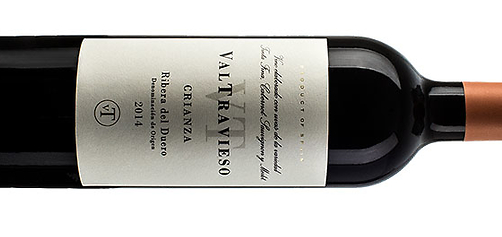Before the Summer, I was sent a bottle of Valtravieso Crianza 2014 to taste it and offer my humble opinion. What better moment than after some days of vacation to restart the season with such a magnificent winery. I had already been able to visit it http://toyadelaguardia.com/valtravieso-bodegas-y-vinedos/ on a trip we made as a group of gastronomic bloggers.

Valtravieso Bodegas y Viñedos, is a modern and functional winery situated in a natural environment with a classical style of winery and wines.
And this is what I want to talk to you about today in “Full Spain https://fullspain.com/ in our section “From Glass to Glass” https://fullspain.com/en/category/from-drink-to-drink/
Valtravieso is a Project in the Ribera del Duero which was born in 1985, when the first vines were planted in the Finca La Revilla, Santa María, El Buey and El Obispo, 920 metros above sea level, making it the highest vineyard in the D.O. Ribera del Duero.
 Valtravieso Crianza 2014 is a coupage of mainly Tempranillo, complemented by the addition of Cabernet Sauvignon and Merlot, which principally come from their own vineyards situated around the winery. The aging is carried out in French oak casks/barrels for 14 months.
Valtravieso Crianza 2014 is a coupage of mainly Tempranillo, complemented by the addition of Cabernet Sauvignon and Merlot, which principally come from their own vineyards situated around the winery. The aging is carried out in French oak casks/barrels for 14 months.
The result is a wine with fresh fruity notes that are well integrated with the wood and a smooth, long lasting palate, full-bodied and perfectly balanced. On the nose the first thing that stands out is its elegance and that its olfactory language is completely Ribereño.
I very much enjoy looking at the labels of the bottles and on this occasion, Valtravieso crianza 2014 continues its tradition of labels which are classical, elegant and understated.
This Crianza 2014 will improve still further in the bottle in some months, rounding out completely, thus allowing us to enjoy a great wine which despite its complexity and body, is easily drunk and has an elegant freshness.

It goes very well with roast lamb, grilled red meat, ground game and cured cheeses.
Personally, I am a real cheese lover, so I decided to pair this wonderful bottle of Valtravieso crianza 2014 with some cured Spanish cheeses, recommended by the greatest experts in the field.
Those selected for my cheeseboard 10:
 Picón Bejes-Tresviso PDO – blue cheese from the Liébana Valley, Cantabria.
Picón Bejes-Tresviso PDO – blue cheese from the Liébana Valley, Cantabria.
 Gamonedo PDO – A partly blue cheese produced in small cheese-making huts in the high mountain passes of Onís and Cangas de Onís in the Picos de Europa.
Gamonedo PDO – A partly blue cheese produced in small cheese-making huts in the high mountain passes of Onís and Cangas de Onís in the Picos de Europa.
 Moluengo – Soft, full-fat cheese coated in vegetable ash, made in Albacete from unpasteurized goat’s milk.
Moluengo – Soft, full-fat cheese coated in vegetable ash, made in Albacete from unpasteurized goat’s milk.
 A cured goat’s cheese, Gran Reserva – Made in Granada
A cured goat’s cheese, Gran Reserva – Made in Granada
 Sheep’s milk cheese Pago Los Vivales Etiqueta Negra – Made with 100% unpasteurized sheep’s milk in Zamora.
Sheep’s milk cheese Pago Los Vivales Etiqueta Negra – Made with 100% unpasteurized sheep’s milk in Zamora.
 Vintage San Vicente – made with unpasteurized sheep’s milk in León
Vintage San Vicente – made with unpasteurized sheep’s milk in León
 Cristo del Prado Semi-cured made with sheep’s milk in Madridejos, Toledo
Cristo del Prado Semi-cured made with sheep’s milk in Madridejos, Toledo
 Artesenal shepherd’s cheese Idiazábal PDO – Made with sheep’s milk in Guipúzcoa
Artesenal shepherd’s cheese Idiazábal PDO – Made with sheep’s milk in Guipúzcoa
 Roque Grande cheese, cured goat’s cheese made in Gran Canaria.
Roque Grande cheese, cured goat’s cheese made in Gran Canaria.
 Aged sheep’s cheese from Iniesta Manzanaro in Ciudad Real.
Aged sheep’s cheese from Iniesta Manzanaro in Ciudad Real.
TECHNICAL NOTES VALTRAVIESO CRIANZA 2014
Winery
Valtravieso Bodegas y Viñedos
Brand
Valtravieso Crianza
Alcohol
14% vol.
Variety
85% Tinta fina, 10% Cabernet Sauvignon, 5% Merlot
tasting notes
The Appearance
Cherry red colour.
The Nose
Fruity aromas from a range of red fruits on a spicy base.
The Palate
A good balance of fruit and barrel. A fresh blast, smooth, and with a polished tannin. A sustained and pleasant tannic evolution. A long finish, with tannins that disappear slowly without astringency.
Serving temperature
Between 15 and 17ºC.
Consumption
Optimal until 2019.
Pairs with
Roast lamb, grilled red meats, ground game and cured cheeses
VINEYARD ANDWINEMAKING
Description
Vineyard divided into four estates: La Revilla, Santa María, El Obispo y El Buey. Situated 915 metres above sea level.
Surface area
More than 70 hectares in total.
Soil
Shallow, stony and very chalky soils.
Harvest
Takes place manually in boxes of 15 kg.
Winemaking
Destemmed and concealed without crushing. Cold pre-fermentation maceration (6ºC) for 7 days followed by alcoholic fermentation using indigenous yeasts (naturally present in the grape skins). Post-fermentation maceration between 7 to 10 days, each plot according to the tasting. Malolactic in tank.
Aging
14 months in French oak barrels.







